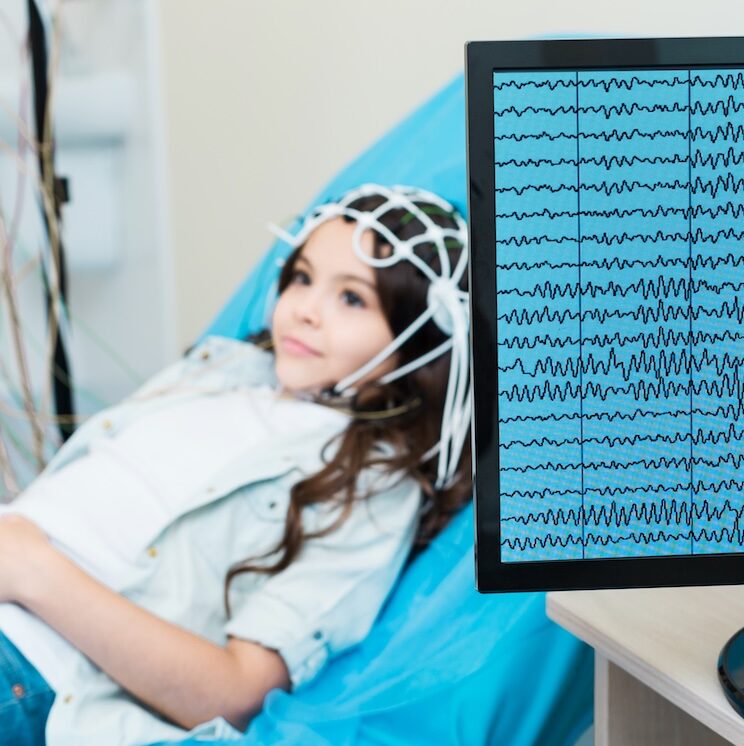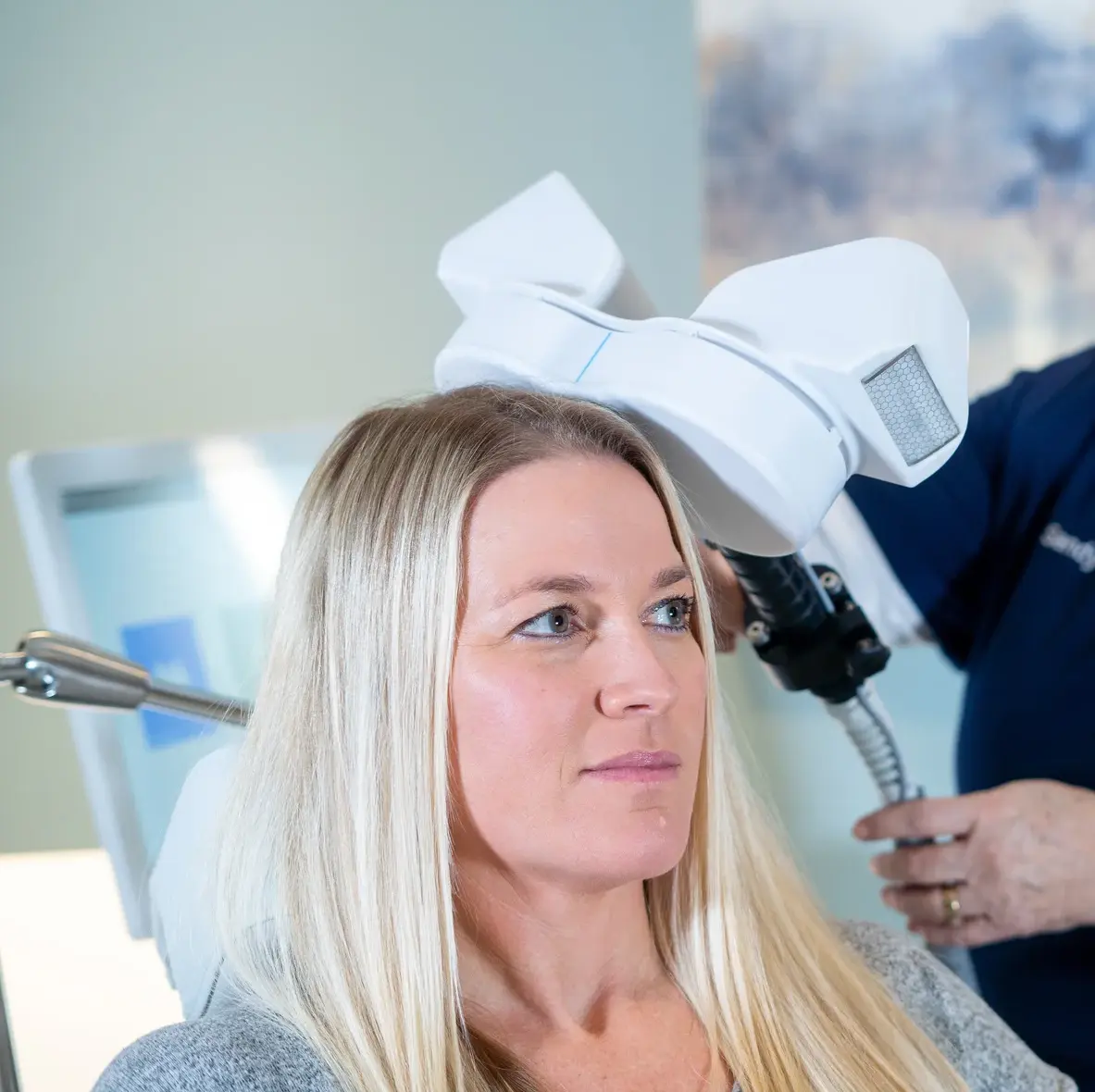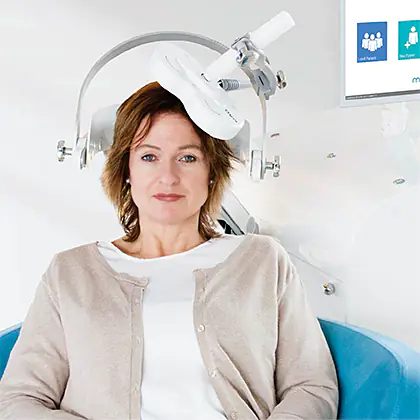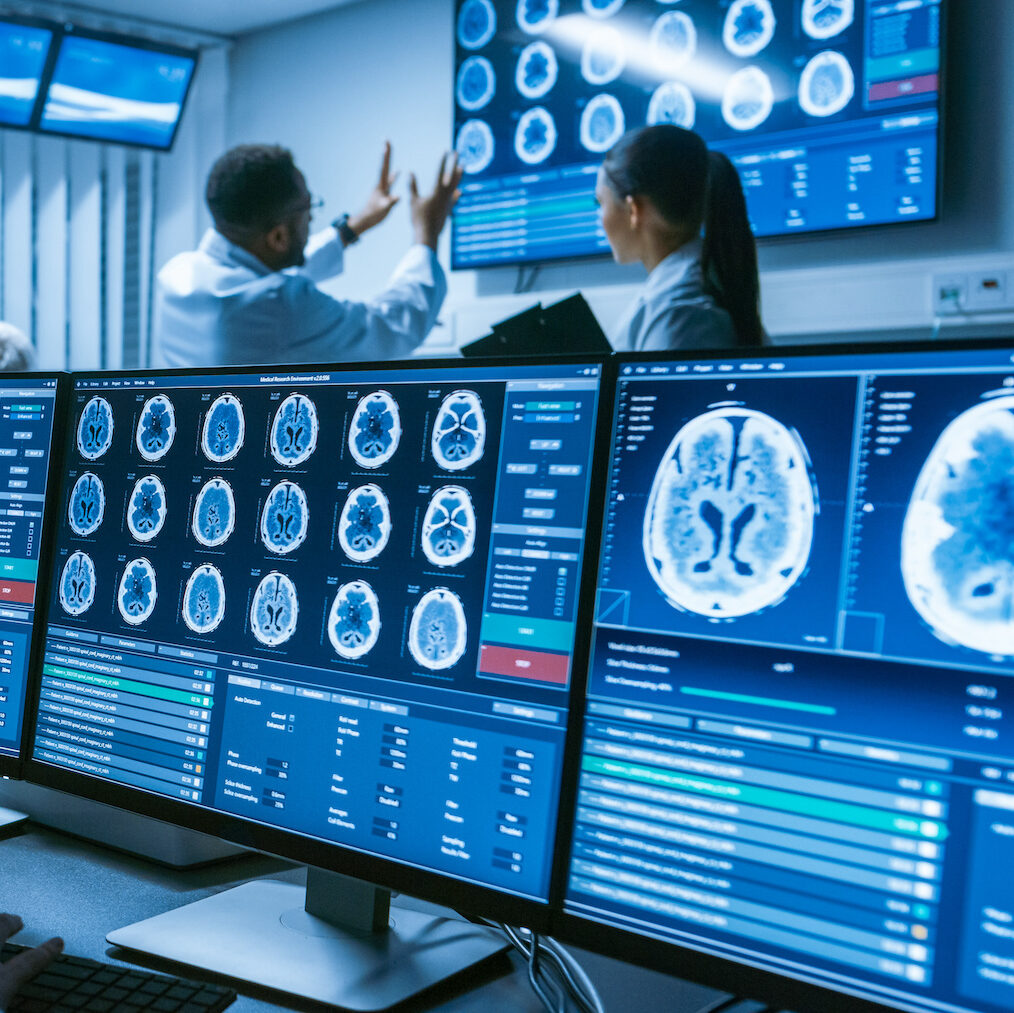
MeRT: An Entirely New Approach to Freeing You from the Bonds of Depression
- FDA-cleared to treat depression, major depressive disorder (MDD), and treatment-resistant depression (TRD)
- Drug-free and non-invasive
- Lasting results
Research Supporting TMS as a Treatment for Depression
Transcranial Magnetic Stimulation (TMS) plays a vital role in MeRT therapy for individuals dealing with depression. A growing body of clinical research highlights the effectiveness of TMS in alleviating symptoms of depression. Below are some of the latest findings from recent studies:
TMS Should Be Considered as First-Line Treatment For Moderate to Severe Major Depressive Disorder, in Psychiatric News, October 2022.
The article’s author, Richard A. Bermudes, reviewed a decade’s worth of studies on the effectiveness of TMS, and wrote this:
“As I read the [APA] guidelines recently and considered the number of new outcome studies conducted with TMS, I believe TMS should be considered, in addition to pharmacotherapy and psychotherapy, as a first-line treatment for patients with moderate to severe major depressive disorder.”
A retrospective chart review to assess the impact of alpha-guided transcranial magnetic stimulation on symptoms of PTSD and depression in active-duty special operations service members, 21 June 2024.
“This data provides a demonstration of significant reduction in PTSD and depression symptoms and safety with the application of a-rTMS in active-duty special operations military personnel. Expansion of targeted neuromodulation programs could be impactful for military and civilian populations.”
Efficacy of repetitive transcranial magnetic stimulation (rTMS) adjunctive therapy for major depressive disorder (MDD) after two antidepressant treatment failures, July 2023.
“Several meta-analyses proved the efficacy of rTMS treatment in MDD, which is comparable to pharmacotherapy, and may have even better tolerability. Our results strengthened that rTMS is associated with clinically relevant antidepressant effect in TRD as well, and may be a beneficial tool in the add-on treatment of patients with TRD. Furthermore, rTMS adjunctive treatment to antidepressants was found to be specifically effective in achieving full remission.”
Transcranial magnetic stimulation (TMS) for major depression: a multisite, naturalistic, observational study of quality of life outcome measures in clinical practice, July 2013.
This study found: “Conclusion: These data confirm that TMS is effective in the acute treatment of MDD in routine clinical practice settings. This symptom benefit is accompanied by statistically and clinically meaningful improvements in patient-reported QOL [quality of life] and functional status outcomes.”
Transcranial magnetic stimulation (TMS) for major depression: a multisite, naturalistic, observational study of acute treatment outcomes in clinical practice, Carpenter et al., 2012.
This study found as its conclusion: “These data indicate that TMS is an effective treatment for those unable to benefit from initial antidepressant medication.”
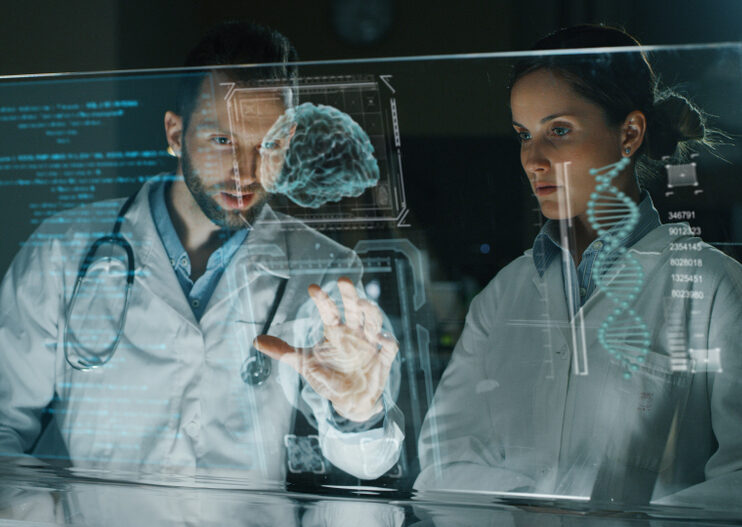
Repetitive Transcranial Magnetic Stimulation for the Treatment of Resistant Depression: A Scoping Review, June 2022.
“Overall, 16 out of the 17 studies suggested that rTMS treatment was effective, safe and tolerated in TRD. For patients with TRD, rTMS appears to provide significant benefits through the reduction of depressive symptoms…”
The association between sample and treatment characteristics and the efficacy of repetitive transcranial magnetic stimulation in depression, Oct 2022.
“Data from nearly 3000 patients from 65 randomized controlled trials were included in this meta-analysis. rTMS was confirmed as efficacious in treating depression when looking at symptom reduction, response and remission.”
Efficacy of repetitive transcranial magnetic stimulation in treatment-resistant depression: the evidence thus far, August 2019.
“rTMS is rapidly gaining popularity as a treatment modality for depression. There is growing evidence to support its use in patients with depression as a monotherapy or as adjunct with pharmacotherapy. Additionally, rTMS has been found to be safe and effective in pregnant patients and elderly patients…”
Use of Transcranial Magnetic Stimulation for Depression, May 2019:
“The clinical efficacy of TMS as an antidepressant has been well established. TMS is an innovative and promising treatment modality for patients with TRD [treatment-resistent depression].”
Experimental depression treatment is nearly 80% effective in controlled study, October 28, 2021:
“In a double-blind controlled study, high doses of magnetic brain stimulation, given on an accelerated timeline and individually targeted, caused remission in 79% of trial participants with severe depression.
“A new type of magnetic brain stimulation brought rapid remission to almost 80% of participants with severe depression in a study conducted at the Stanford University School of Medicine.
MeRT Treatment for Depression
Hear it from the Patients
“My experience at the Brain Treatment Center was life-changing. I struggled through years of sleeplessness, constant worry, and struggle with everyday life. Halfway through my first treatment plan, my spirit was revived.
“My loved ones, acquaintances, and people I met started to comment on my positivity and overall demeanor. I went from losing hope to cherishing every moment.
“I would urge anyone who is struggling with head injury, depression, PTSD, or any type of psychological struggle(s) to pick up the phone and inquire. Your best days are still to come.”
John G.
“For me, depression was the constant feeling of, ‘I want to quit’ and retreat to my home, except I already would be home. MeRT helped me shed this feeling in less than two weeks. I couldn’t believe I had spent so many years feeling this way!”
MeRT Patient
““I am amazed at the positive physiological and cognitive impact that resulted from MeRT treatment. I am able to process information more readily, recall and retrieve past experiences, facts, and memories much better, and have improved sleep and more energy. All of this from a relatively short span of treatments that were non-invasive, painless, and short in duration. Finally, the treatment team was knowledgeable, provided excellent customer service, and walked me through every step of the process with a great attitude. I look forward to occasionally having additional treatments to further improve my outcomes.”
MeRT Patient
“Everything changed when I started treatment. Within two weeks, I was sleeping better. I was off all 12 of my meds that I was on when I started treatment, and I was starting to enjoy life again.
“After the first month, I was socializing with people again, I was able to work out for the first time in years, and I started to help my wife with the bills and our budget. A conservative estimate is that I have had a 60 – 70% reduction of the symptoms and have a whole new lease on life.
“I can focus, feel good about myself, feel confident, and laugh again. Most importantly, I can feel the love for and from my family again. I have never met a group of people who truly are solely focused on helping people feel human again. Spend a day here, and you will see a miracle.”
MeRT Patient
“I just finished six weeks of their specialized form of TMS treatment, and it is life-changing. If your depression or anxiety has been resistant to medications, therapy, or other forms of treatment, I highly recommend the Brain Treatment Center.”
Mary Ann E.
“I’m a veteran with a history of PTSD, anxiety, depression and poor sleep. I was spiraling into a dark place and didn’t know how to go on. In just a couple of weeks, my sleep improved. Today I’m more alert, interacting positively with those around me and I feel confident I’m on the right course for a healthier life. My friends and family noticed the positive shift in my outlook and they appreciate what MeRT has done for us. The staff is genuinely helpful and compassionate. The physical setting is professional, clean and comfortable; I actually looked forward to my regular visits. I can’t say that about any medical treatment I received before MeRT. I am completely satisfied with my experience and am thankful for this non-invasive treatment option.”
Veteran
“I felt like I was alone even though I was surrounded by love and care. It was just a cloud that would linger over my life every now and again. BTC helped me understand what was going on in my head, and after a month of treatment, I was grateful to be DEPRESSION FREE and MEDICATION FREE for the first time in my life.”
MeRT Patient
“For anyone suffering from depression, anxiety, and other symptoms, I highly recommend trying MeRT. My adult son, who has suffered from both problems his entire life and has been on medication, realized a positive change after the first visit. We saw dramatic improvement after each visit. This technology is truly a magic bullet.”
Harold H.
Executive“I’ve made significant progress in cognitive ability, stress tolerance, and mental clarity. I have been able to handle decisions much better and think clearer. And I have been able to significantly decrease conflict with my family and actually lead much better.”
MeRT Patient
“I am a relatively healthy adult male in my mid-forties and deal with the normal day-to-day issues as most people. In recent years, I noticed my ability to multitask has diminished, my memory is not what it used to be, I am easily agitated and I can’t recall the last time I slept for a more than 3-4 continuous hours. I also have Sensory Processing Disorder that is mostly triggered by sound. I have seen vast improvements across the board since receiving MeRT treatment. It is truly night and day from before. This is the real deal!”


